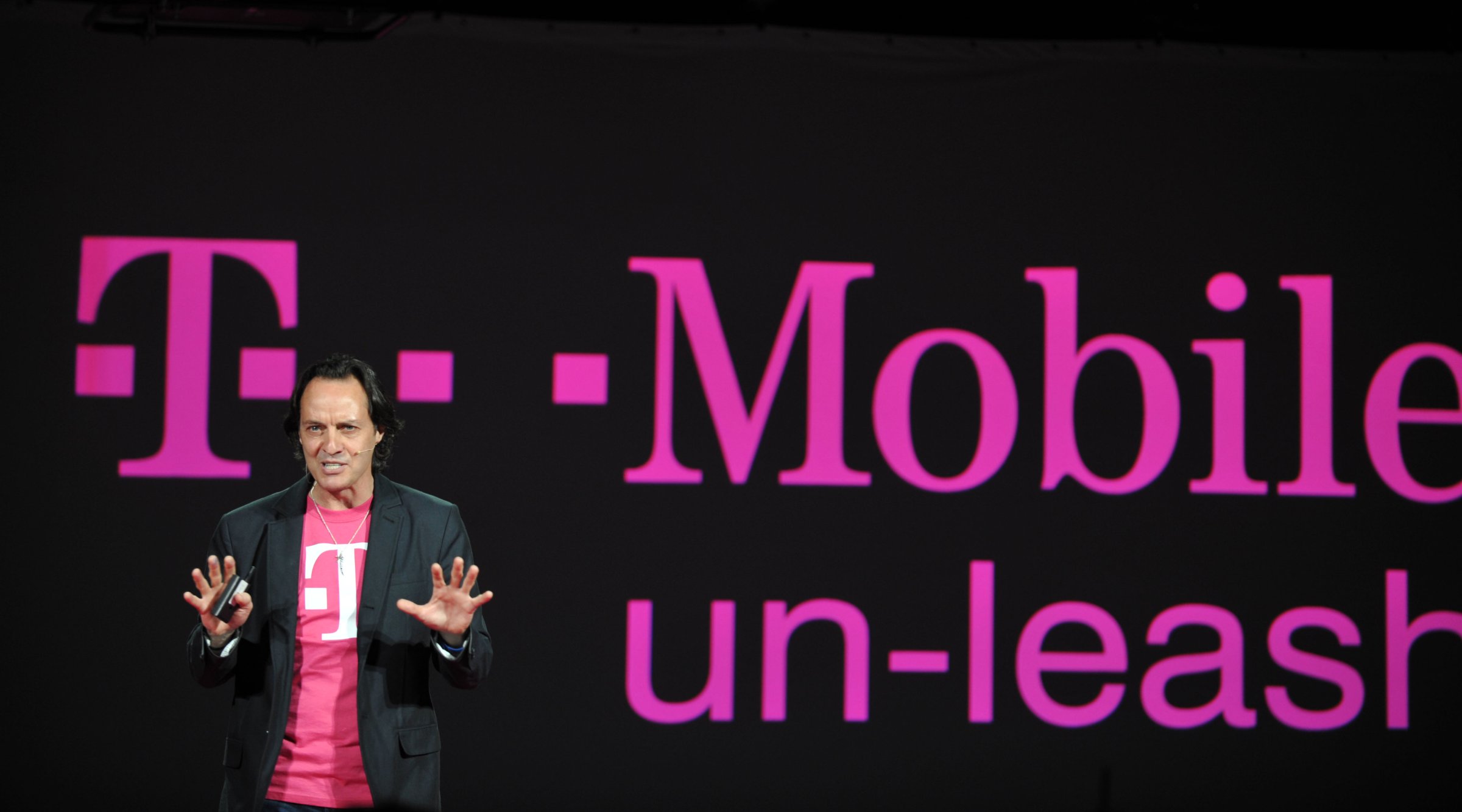
If Sprint goes through with its rumored acquisition of wireless carrier T-Mobile, it will acquire about close to 50 million wireless subscribers, a company that generates $24 billion in annual revenue and a loud-mouth CEO that is said to be the leading candidate for steering the new, combined company.
John Legere was once a buttoned-up corporate suit for the international divisions of companies like AT&T and Dell, as well as the CEO of the now-defunct telecommunications company Global Crossing Limited. But he dumped the typical executive attire in favor of a blazer, jeans and a magenta T-shirt when he took over the ailing T-Mobile in the fall of 2012. The unusual attire fits his brash corporate strategy, which is basically to dismantle all the money-making fees the wireless industry has baked into cell phone plans over the years.
Through its “Uncarrier” campaign, T-Mobile has eliminated two-year contracts, gotten rid of international data charges and offered customers huge subsidies to lure them away from competitors. At first, the moves seemed like a desperate ploy from a last-place company. But T-Mobile has steadily added subscribers as it has offered more headline-grabbing deals, racking up 2.8 million additional postpaid subscribers since Legere took charge. The other carriers have tried to stop the company’s rise by lowering prices and offering some bribes of their own, but that hasn’t blunted T-Mobile’s momentum. In the first quarter of the year, T-Mobile added more new subscribers than the other three carriers combined. “T-Mobile’s results since they started this almost two years ago speak for themselves,” says Bill Menezes, principal research analyst at Gartner. “It really has changed the way all the big carriers now offer their service.”
Beyond overseeing strategy, Legere has given T-Mobile’s brand awareness a huge boost. He has almost 250,000 Twitter followers and regularly mocks his competitors by name. At the Consumer Electronics Show in January, he got kicked out of an AT&T party, generating tons of free press for his company. He issued a fake press release earlier this year in which he compared AT&T to Darth Vader. Is the rebel act all for show? Perhaps—Legere has been in the telecommunications industry for more than 30 years and at one point worked for current Sprint CEO Dan Hesse at AT&T. But Legere’s persona, authentic or not, aligns well with T-Mobile’s branding as a disruptor.
“Legere has been very successful in translating his personality style and kind of getting that across to the industry as someone that’s disruptive, someone that’s unorthodox in his presentation and his language,” says Wayne Lam, a wireless communication analyst at IHS technology. “He’s kind of personified that new T-Mobile brand.”
Legere’s marketing skills and business smarts have made him the primary candidate to lead the combined Sprint-T-Mobile, according to Bloomberg. “He’s seen as a dynamic figure who’s been successful at changign things in the cellular industry, and that’s really something that Sprint needs,” Menezes says.
Masayoshi Son, the CEO of Softbank, which owns Sprint, said last week at a tech conference that he admires Legere. Son has also indicated that he is fan of T-Mobile’s deep-discount strategy and believes it could be effective at scale. “I’m not content for Sprint to remain No. 3 because if we could grow bigger, we will offer aggressive discounts and services, just like we did in Japan,” he said earlier this year.
Still, T-Mobile is on a bit of a running clock because its effort to attract new customers is wildly unprofitable. The company posted a $151 million loss in the first quarter and missed analyst estimates for both earnings and revenue. A merger would instantly give the combined Sprint-T-Mobile about double the subscriber base, as well as the financial backing of Softbank, which generated more than $5 billion in profit in the 2013 fiscal year. The combined company would also have a more reliable network that would come closer to approaching the quality of AT&T’s and Verizon’s, Lam says.
Legere wins in a potential Sprint merger no matter the outcome. Either he becomes CEO of a larger telco that could legitimately compete with the top two carriers, or he gets a severance package of up to $42 million if he’s not hired at the merged company. Legere has said that a merger could be good for T-Mobile, but he’d like to stay in control. “I have no desire to turn T-Mobile into the son of something else,” he told Business Insider earlier this year.
Consumers hardly have such clear winning scenarios. There’s no guarantee that a larger, less desperate T-Mobile wouldn’t roll back its disruptive ambitions. The brand itself might eventually be swallowed whole by Sprint, which is what happened to former carriers such as Cingular Wireless and Alltel. And company consolidation is what created the fee-ridden industry that T-Mobile has so effectively disrupted in the first place. This four-horse race has been good for consumers, but there’s no telling how competitive dynamics may shift if the number of competitors dwindles to three.
“You’re eliminating a consumer choice,” Menezes says. “Any time you eliminate choice, I don’t believe that that’s good for consumers.”
More Must-Reads From TIME
- The 100 Most Influential People of 2024
- Coco Gauff Is Playing for Herself Now
- Scenes From Pro-Palestinian Encampments Across U.S. Universities
- 6 Compliments That Land Every Time
- If You're Dating Right Now , You're Brave: Column
- The AI That Could Heal a Divided Internet
- Fallout Is a Brilliant Model for the Future of Video Game Adaptations
- Want Weekly Recs on What to Watch, Read, and More? Sign Up for Worth Your Time
Contact us at letters@time.com